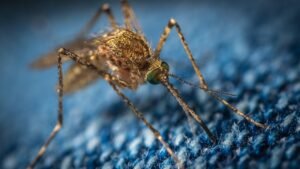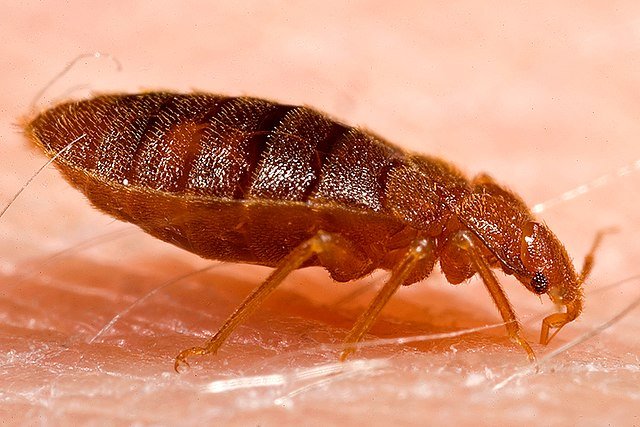Mosquitoes: Lifespan, Dangers, and How to Keep Them Away
 Mosquitoes are some of the most hated insects in the world. They are small, fragile, and look harmless at first sight, yet they are responsible for more deaths every year than lions, snakes, or sharks. From itchy bites in the garden to serious diseases like malaria or West Nile virus, mosquitoes have shaped human history in ways few other insects ever have.
Mosquitoes are some of the most hated insects in the world. They are small, fragile, and look harmless at first sight, yet they are responsible for more deaths every year than lions, snakes, or sharks. From itchy bites in the garden to serious diseases like malaria or West Nile virus, mosquitoes have shaped human history in ways few other insects ever have.
But what makes them so persistent? Why do they target some people more than others? And most importantly, how can you keep them away from your home and family? This guide explores the mosquito life cycle, how long they live, the real dangers they carry, and the most effective ways to protect yourself.
What exactly is a mosquito?
A mosquito is a small flying insect belonging to the family Culicidae. Most adult mosquitoes measure only 3–6 millimeters, but their long legs and thin wings make them instantly recognizable. They have a unique mouthpart called a proboscis, which females use to pierce the skin and suck blood.
-
Male vs female: Males feed only on nectar and plant juices. Females also need nectar for energy, but they bite humans and animals because they require proteins from blood to develop fertile eggs.
-
Color: Depending on species, mosquitoes can look gray, brown, or even black with white or blue markings.
-
Sound: The classic high-pitched buzzing around your ear at night is caused by the rapid wing beats—up to 600 beats per second in some species.
There are more than 3,500 known species of mosquitoes worldwide, but only a few hundred regularly bite humans.
How long do mosquitoes live?
Mosquito lifespan may sound short, but it’s long enough for them to cause trouble.
-
Average lifespan: 2 to 4 weeks for most species.
-
Females: Often live longer than males. Some can survive for up to 6–8 weeks if conditions are good.
-
Males: Usually die within a week after mating, since they only drink nectar and do not store much energy.
-
Overwintering: In colder regions, some mosquito species survive winter by hiding as adults in caves, sheds, or basements, while others overwinter as eggs or larvae.
The short but intense life of a mosquito is enough for females to lay hundreds of eggs, ensuring the next generation.
The mosquito life cycle explained
Understanding the mosquito life cycle is key to stopping them. They go through four main stages:
-
Eggs: Female mosquitoes lay eggs on the surface of water or in damp soil that will later flood. Depending on the species, a female can lay between 50 and 200 eggs at a time. Some species lay eggs that stick together like tiny rafts on standing water.
-
Larvae: After 24–48 hours, eggs hatch into larvae, sometimes called “wrigglers.” They live in water, feeding on microorganisms, algae, and organic matter. They must come up to the surface to breathe.
-
Pupae: After several days or weeks, larvae turn into pupae (“tumblers”). This is a resting stage where they do not eat, but prepare to become adults.
-
Adult mosquito: After a few days, the adult mosquito emerges from the water surface, dries its wings, and begins to fly.
The entire cycle can be completed in 7–14 days in warm climates with enough water. This explains why even a small puddle or a forgotten bucket in your yard can quickly create a mosquito problem.
Where do mosquitoes live?
Mosquitoes need three things to survive: water, warmth, and food. That means they are found almost everywhere humans live.
-
United States: From Florida swamps to Midwest suburbs, mosquitoes are everywhere. The Asian tiger mosquito (Aedes albopictus) has expanded across many states and is active even during the day.
-
Europe: Southern Europe often faces summer mosquito problems, with outbreaks of West Nile virus in Italy and Greece. In northern Europe, mosquitoes are less dangerous but still common around wetlands.
-
Australia: Coastal and tropical regions face heavy mosquito pressure, including species that spread Ross River virus. Even cities like Sydney and Brisbane report seasonal swarms.
-
Asia: Countries like India, Thailand, and Indonesia face high malaria and dengue cases due to dense mosquito populations.
-
Africa: The biggest global hotspot, especially for malaria transmitted by Anopheles mosquitoes.
Indoors, mosquitoes hide in cool, shaded corners during the day—under furniture, inside closets, or in bathrooms. Outdoors, they breed in any stagnant water, from swamps and ponds to flowerpots and old tires.
Why do mosquitoes bite some people more than others?
Many people believe mosquitoes “like” them more than their friends. Science shows there is some truth to this.
-
Blood type: People with type O blood are bitten more often than those with type A or B.
-
Carbon dioxide: Mosquitoes can sense CO₂ from human breath from over 30 feet away. People who exhale more CO₂ (larger individuals, pregnant women) attract more mosquitoes.
-
Skin bacteria: The mix of microbes on your skin produces odors. Some bacteria make people more attractive to mosquitoes.
-
Body heat and sweat: Lactic acid in sweat attracts mosquitoes. Warmer skin temperatures also draw them in.
-
Clothing color: Dark clothes make you easier to spot, while light colors are less attractive.
-
Perfumes: Floral or fruity scents can increase mosquito interest.
In short, mosquitoes use a combination of smell, sight, and heat sensors to choose their targets.
Why are mosquitoes dangerous?
A bite may just leave an itchy red bump, but the real danger is disease transmission. Mosquitoes are considered the deadliest animals on earth because of the pathogens they spread.
-
Malaria: Caused by Plasmodium parasites, spread by Anopheles mosquitoes. Still kills hundreds of thousands every year, mostly in Africa.
-
Dengue fever: Spread by Aedes aegypti. Causes high fever, joint pain, and in severe cases, hemorrhagic fever. Common in Asia, Latin America, and spreading to Europe.
-
West Nile virus: Found in the United States and Europe. Many infections are mild, but some cause severe brain inflammation.
-
Zika virus: Famous for the 2015–2016 outbreak in Brazil. Linked to birth defects in babies.
-
Yellow fever: Historically deadly, still a risk in Africa and South America. Vaccination prevents it.
-
Chikungunya: Causes severe joint pain, often in tropical regions.
-
Ross River virus: Common in Australia, causes fever and fatigue.
-
Eastern equine encephalitis (EEE): Rare but very serious, found in the eastern U.S.
Not every mosquito bite leads to disease. But because mosquitoes bite often and feed on many different hosts, they are efficient carriers of viruses and parasites.
What mosquitoes mean for everyday life
For most homeowners in the U.S., Canada, or Europe, mosquitoes are more of a nuisance pest than a direct health crisis. But they still impact daily life:
-
Backyard barbecues ruined by swarms.
-
Families avoiding gardens or balconies in the evening.
-
Businesses like restaurants losing outdoor customers.
-
Parents worried about bites on children.
-
Travelers afraid of infections abroad.
That’s why mosquito control is not only about global diseases, but also about quality of life.
How can you prevent mosquitoes at home?
The best way to fight mosquitoes is not by chasing them after they bite, but by making sure they cannot breed or survive around your house. Because mosquitoes need water for their eggs and larvae, prevention begins with removing water.
Step 1 – Eliminate standing water
-
Empty flowerpot saucers, old tires, buckets, and anything that collects rainwater.
-
Change birdbath water at least twice a week.
-
Keep swimming pool covers dry.
-
Clean gutters so they do not trap water.
Step 2 – Proof your house
-
Install window and door screens with no holes.
-
Use door sweeps to block gaps.
-
Keep basement and bathroom areas well ventilated with fans or dehumidifiers.
Step 3 – Yard care
-
Trim tall grass and shrubs where mosquitoes rest during the day.
-
Use outdoor fans on patios—they hate moving air.
-
Plant natural repellents like citronella, lavender, and basil.
What repellents actually work?
There are many products on the market, but not all are equal. Science has tested several repellents and found clear winners.
-
DEET (20–30%): Still the gold standard for mosquito protection. Safe when used as directed, even for children over 2 months.
-
Picaridin (20%): Almost odorless, effective like DEET, and less greasy.
-
Oil of Lemon Eucalyptus (OLE, 30–40%): A plant-based option proven effective for several hours. Not for kids under 3 years.
-
IR3535: Found in many European repellents, safe and effective.
Natural oils: Peppermint, citronella, or lavender can help for short periods but are less reliable. They may be good for indoors or light use, but not for heavy exposure.
Repellent myths:
-
Ultrasonic devices? No scientific proof.
-
Wristbands with repellents? Too localized, not effective.
-
Eating garlic or vitamin B? No evidence.
Chemical vs natural control outdoors
For yards and gardens, some homeowners use sprays.
-
Larvicides (Bti, methoprene): Safe bacteria or growth regulators that kill larvae in water before they become adults. Often used by city mosquito programs.
-
Adulticides (fogging): Sprays that kill adult mosquitoes. Effective for a short time but should only be applied by professionals.
For natural alternatives:
-
Fish like guppies or goldfish eat mosquito larvae in ponds.
-
Mosquito dunks (Bti tablets) are safe for birdbaths and fountains.
-
Dragonflies and bats are natural predators, but relying only on them is not enough.
New scientific methods against mosquitoes
In recent years, scientists have developed modern strategies to control mosquito-borne diseases.
-
Wolbachia bacteria: Released into mosquito populations to block viruses like dengue and Zika. Already tested in Australia, Indonesia, and Florida with good results.
-
Genetically modified mosquitoes: Designed to produce sterile offspring, reducing mosquito numbers. Trials are running in Brazil and the U.S.
-
Sterile insect technique: Males are sterilized with radiation and released, lowering reproduction.
These methods are promising for large-scale control, but for homeowners, daily prevention is still the first defense.
Common myths about mosquitoes
-
“All mosquitoes bite.”
No. Only females bite, and they do it to lay eggs. -
“Mosquitoes die after biting.”
False. Unlike bees, they can bite many times. -
“They only breed in swamps.”
False. A bottle cap with water is enough for eggs. -
“Bug zappers kill mosquitoes.”
Not really. Most zapped insects are moths or beetles.
Mosquitoes and pets
Pets can also suffer from mosquito bites. Dogs are at risk of heartworm disease, a dangerous parasite spread by mosquitoes. Vets often recommend preventive medication in high-risk areas. Horses can also be affected by viruses like Eastern equine encephalitis.
Protect pets with:
-
Mosquito-proof screens for kennels.
-
Pet-safe repellents recommended by veterinarians.
-
Eliminating standing water in yards where pets roam.
Global view: How different regions fight mosquitoes
-
United States & Canada: County mosquito control programs with traps, larvicides, and public alerts.
-
Europe: Southern countries use larvicide treatments in rice fields and wetlands; northern Europe focuses on drainage and prevention.
-
Australia: Strong focus on Ross River virus prevention, with public education and community cleanup campaigns.
-
Asia & Africa: International organizations run mosquito net distribution, indoor spraying, and vaccine development programs against malaria and dengue.
Wherever you live, the combination of personal protection + community control is the key.
FAQ – People also ask
How long do mosquitoes live indoors?
Usually 2–4 weeks, but if trapped in a house with water and food, females can survive longer.
Can mosquitoes breed in clean water?
Yes. They only need still water, whether dirty or clean. Even fresh rainwater in a container is enough.
Why do mosquito bites itch so much?
Their saliva contains proteins that stop blood from clotting. Your immune system reacts with histamines, causing redness and itching.
Can mosquitoes bite through clothes?
Thin fabrics like leggings or t-shirts may not stop their proboscis. Loose, thick clothing is safer.
What time of day are mosquitoes most active?
Most species bite at dawn and dusk, but the Asian tiger mosquito bites all day long.
Do mosquito coils and candles really work?
They help in small outdoor spaces, but only reduce bites a little. Fans and repellents work better.
Final thoughts
Mosquitoes may be tiny, but their impact is massive. From ruining summer evenings to spreading deadly diseases, they are more than just a nuisance. The good news is that you can protect yourself. By removing standing water, using proven repellents, and sealing your home, you cut off their chances to breed and bite.
For bigger problems, local pest professionals and public health programs can step in. And as science develops new tools like Wolbachia and genetic control, the future may finally bring long-term relief from the world’s most dangerous insect.
Sources
A Case for Systematic Quality Management in Mosquito Control Programmes in Europe
Defeating dengue with GM mosquitoes
Saving lives by managing disease-carrying mosquitos
Disclaimer
This article is for informational purposes only. Pest control laws and approved chemicals vary by country. For best results and legal safety, we strongly recommend contacting a licensed pest control professional in your local area. Always make sure that the pest control technician is properly certified or licensed, depending on your country’s regulations. It’s important to confirm that they only use approved products and apply them exactly as instructed on the product label. In most places in Europe, UK, or USA, following label directions is not just best practice—it’s the law.
Author
Nasos Iliopoulos
MSc Agronomist & Certified Pest Control Expert
Scientific Director, Advance Services (Athens, Greece)
Licensed Pest Control Business – Ministry of Rural Development & Food (GR)

